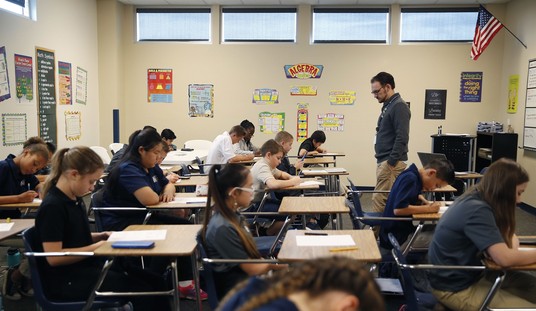Corruption and poverty in the Third World are often observed together. But which causes which? Which is the chicken and which the egg? Take the town of Juarez in Mexico, which is right across the border from El Paso, Texas. The BBC recently characterized the violence there as a struggle between the forces of law and order and violent drug cartels. Good versus evil. But others are not so sure. Some residents, who refused to be named, saw the drug cartels as a symptom of the lack of law and order in Mexico. In that narrative, the government was simply another gang fighting for the very same spoils the drug cartels were striving for.
The children of El Paso’s Glen Cove Elementary School have not been told that a gunman shot their classmate dead. Nor have they been told that someone across the Rio Grande in Mexico thought nothing of killing the seven-year-old. Or that the gunman left Jociel Ramierez alone to die, as the blood seeped out of his body on a busy roundabout. … He may not be the first US citizen to be killed in what have been called Mexico’s drug wars, but he probably is the youngest. His death is also a vivid illustration of how low Juarez has fallen, and how little the Mexican authorities seem able do about it.
When Felipe Calderon became president almost three years ago, he declared war on the drug cartels that he blamed for the breakdown of law and order across the country. … The Mexican government believes that given time it will win the fight. … some are beginning to question that certainty … People like Jociel Ramierez’s aunt, who prefers not to be named for fear of retribution, and who has a different solution to the problem: “We have to end corruption, maybe that’s the way to finish it.”
The BBC authors argue that what is fueling corruption — and by extension the drug trade — is poverty. “Poverty is blamed for driving many into the arms of drug cartels.” And poverty, in the eyes of some is the inevitable consequence of globalization. Others however, have taken a different view. Corruption is the problem. In that narrative the arrow of causality goes at least partially in the other direction. Nations are not corrupt because they are poor. Countries are poor because they are corrupt.
“We have an unsustainable economy – a globalised economy – which pays very low wages. That allowed an alternative economy to be created which also globalised – drugs. Both economies are playing here. Juarez is a very important place for both.” … the Mexican economy functions for an elite group – not for the average person. A teacher for instance gets 3,000 pesos every week ($230) – transporting drugs around the country can get you up to 30 times more than that he tells me. Poverty is driving many into the arms of the very cartels the government wants to wipe out. …
Many, though, like the businessman who prefers to remain anonymous, believe it will take something more. “What we need to change is our political model. We need to establish to establish a rule of law that functions, that gives rights to every citizen, so that they are not taken advantage of.”
In many ways the question of which end of the poverty-corruption system to begin represents the central problem in development — and even counterinsurgency — theory. Two economics professors, Raymond Fisman and Edward Miguel in a book called Economic Gangsters appear to link the two in the following way: in much of the world there’s simply no incentive to being honest and therefore dishonesty has become a way of life. Anyone who doubts that can simply follow Third World diplomats at the UN as they flick away their parking tickets.
Meet the economic gangster. Hes the United Nations diplomat who double parks his Mercedes on a New York street at rush hour, because the cops can’t touch him — he has diplomatic immunity. He’s the dictator, the warlord, the black marketeers, the unscrupulous bureaucrat who bilks the developing world of billions of aid and keeps many communities in a cycle of violence and poverty.
Now the economic gangster is likely to be the Western diplomat’s friend, if only because that is who commonly must deal with in countries like Mexico. And he is likely to receive sympathetic treatment from members of the Western Press — what with his colorful local costume, quaint accent and penchant for blaming all the ills of the world on the West. But to most of the people in his home country the economic gangster is the man on the big white house on the hill with an army of bodyguards to protect him.
To Professors’s Fisman and Miguel the basic solution is simple: at least the principles were — to use economics to increase the benefits of honesty and increase the costs of dishonesty. They write: “Basic economic principles … can help guide us … greater government financial transparency … increasing the salaries of government officials to reduce bribe-taking … the stick in the policeman’s cost-benefit trade off … credible threat of punishment … that’s all there is to it.”
But as the (UK) Times Higher Education website put it, asking the Western intelligensia to put their faith in such principles is asking for an awful lot. How can anyone trust greed and fear, or worse yet a combination of greed and fear — the policeman’s cost-benefit trade off between a slightly larger salary and a much higher threat of punishment — to reduce corruption and poverty in the Third World. But the Times site was at least willing to admit that the concept seemed appealing.
It is hard to think of a better time for a book with the title Economic Gangsters to hit the shelves. At the peak of the financial crisis, terms such as “greed”, “morality” and “financial crimes” dominated public and political discourse. Obvious to everybody, “economic gangsters” had been at work in financial markets, which were now in need of a strong injection of morality after unrestrained market forces and immoral bankers had failed us utterly. … Economic Gangsters is the latest example in a string of popular accounts of economics that offer to show how to make use of its insights in all realms of life.
But the misgivings about relying on the simple power of markets are not entirely misplaced. Fixing the incentives are not “all there is to it”. Somebody has to jump start it and take the first step; to insist on the road audits in Indonesia or shame corrupt officials in Bogota. Somebody has to take Kenyan cops to court and shepherd the proposal for slightly higher police salaries through its byzantine bureaucracy. Somebody has got to un-elect corrupt Mexican officialdom and put the finger on gangsters in Juarez. In other words, somebody has got to take the risk and bell the cat, to get the ball rolling, simply to sell the idea that standards ought to exist and market forces have to be harnessed to end corruption and poverty. That’s all there is to it, but it’s a lot.
Breaking the cycle of corruption, poverty and violence in the Third World requires an initial infusion of force and good governance in order to make the subsequent economic development work. The experience in Iraq dramatically demonstrated that security was not simply the outcome of economic development, it was its also its necessary condition. Security and governance was at once the precondition and the outcome of creating a correct system of incentives. The egg was necessary for the chicken and the chicken necessary for the egg. The administration’s current dilemma in Afghanistan stems from their desire to create the former without the latter; to use diplomacy and economic development to achieve security without protecting it with security. They want the egg without the chicken; to produce something from outside the cycle. No wonder President Obama is taking such a long time to figure it out.
The decision to commit an initial infusion of force or influence to establish good governance represents the riskiest part of the intervention curve. Once the incentive-punishment function is established, things can proceed more easily. But that initial step is fraught with political risk. In the early 19th century, military commanders understood that greatest cost would have to be borne the troops who made the breach in the enemy defenses. They were called the Forlorn Hope. In the market for heroes the payoff was simply what Napoleon called “a bit of colored ribbon”.
A forlorn hope is a band of soldiers or other combatants chosen to take the leading part in a military operation, such as an assault on a defended position, where the risk of casualties is high. The term comes from the Dutch verloren hoop, literally “lost heap”, and adapted as “lost troop”. … In the days of muzzle-loading muskets, it was most frequently used to refer to the first wave of soldiers attacking a breach in defences during a siege. It was likely that most members of the forlorn hope would be killed or wounded. The intention was that some would survive long enough to seize a foothold that could be reinforced, or at least that a second wave with better prospects could be sent in while the defenders were reloading or engaged in mopping up the remnants of the first wave.
A forlorn hope was typically led by a junior officer with hopes of personal advancement. If he survived, and performed courageously, he was almost guaranteed both a promotion and a long-term boost to his career prospects. As a result, despite the risks, there was often competition for the opportunity to lead the assault. The French equivalent of the forlorn hope, called Les Enfants Perdus or The Lost Children, were all guaranteed promotion to officers should they survive, so that both men and officers took up the suicidal mission as an opportunity to raise themselves in the army.
So while the problems in Mexico, Iraq, Afghanistan and maybe Chicago will in the long run be solved by fixing the “incentives problem” — a conclusion for which we should always be indebted to Professors Fisman and Miguel for — the task will have to be achieved under the protection of a Forlorn Hope: a generation of politicians, policemen, soldiers and activists for whom there will be no reward. Not even the dawn. Though one hopes for the colored ribbon or at least the fond memory of Felina at Rosie’s Cantina.
“‘Twas once in the saddle I used to go dashing,
‘Twas once in the saddle I used to go gay.
First to the dram-house, and then to the card-house,
Got shot in the breast, and I’m dying today.”Muffle your drums, play your pipes merrily,
Play the death march as you go along.
And fire your guns right over my coffin,
There goes an unfortunate lad to his home“Get six jolly cowboys to carry my coffin,
Get six pretty maidens to bear up my pall.
Put bunches of roses all over my coffin,
Roses to deaden the sods as they fall.”










Join the conversation as a VIP Member